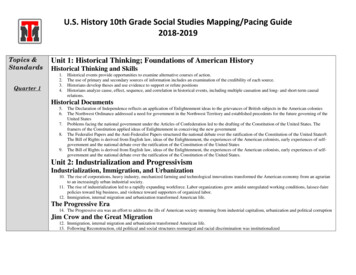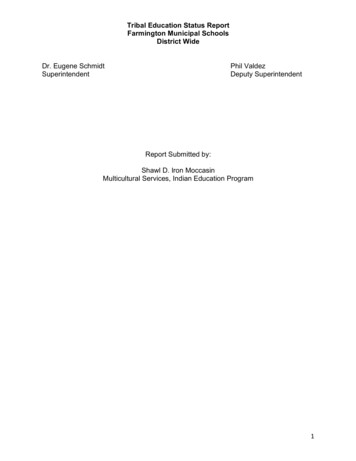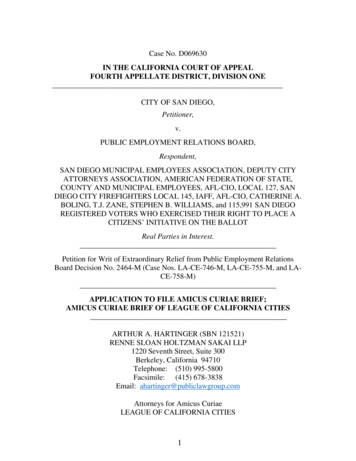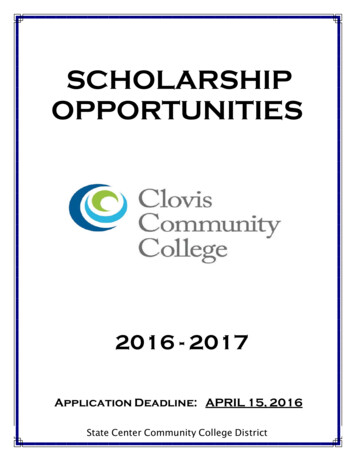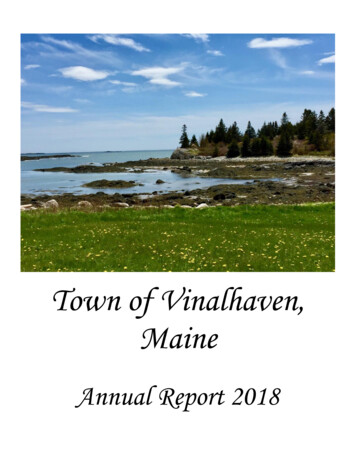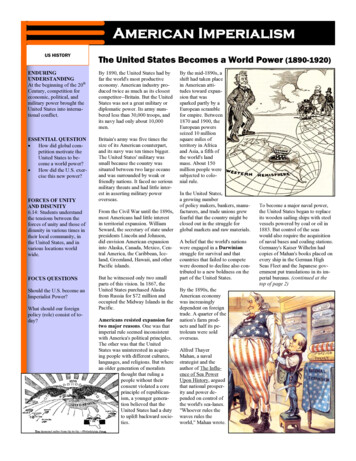
Transcription
American ImperialismUS HISTORYThe United States Becomes a World Power (1890-1920)ENDURINGUNDERSTANDINGAt the beginning of the 20thCentury, competition foreconomic, political, andmilitary power brought theUnited States into international conflict.By 1890, the United States had byfar the world's most productiveeconomy. American industry produced twice as much as its closestcompetitor--Britain. But the UnitedStates was not a great military ordiplomatic power. Its army numbered less than 30,000 troops, andits navy had only about 10,000men.ESSENTIAL QUESTIONx How did global competition motivate theUnited States to become a world power?x How did the U.S. exercise this new power?Britain's army was five times thesize of its American counterpart,and its navy was ten times bigger.The United States' military wassmall because the country wassituated between two large oceansand was surrounded by weak orfriendly nations. It faced no seriousmilitary threats and had little interest in asserting military poweroverseas.FORCES OF UNITYAND DISUNITY6.14: Students understandthe tensions between theforces of unity and those ofdisunity in various times intheir local community, inthe United States, and invarious locations worldwide.FOCUS QUESTIONSShould the U.S. become anImperialist Power?What should our foreignpolicy (role) consist of today?From the Civil War until the 1890s,most Americans had little interestin territorial expansion. WilliamSeward, the secretary of state underpresidents Lincoln and Johnson,did envision American expansioninto Alaska, Canada, Mexico, Central America, the Caribbean, Iceland, Greenland, Hawaii, and otherPacific islands.But he witnessed only two smallparts of this vision. In 1867, theUnited States purchased Alaskafrom Russia for 72 million andoccupied the Midway Islands in thePacific.Americans resisted expansion fortwo major reasons. One was thatimperial rule seemed inconsistentwith America's political principles.The other was that the UnitedStates was uninterested in acquiring people with different cultures,languages, and religions. But wherean older generation of moraliststhought that ruling apeople without theirconsent violated a coreprinciple of republicanism, a younger generation believed that theUnited States had a dutyto uplift backward societies.By the mid-1890s, ashift had taken placein American attitudes toward expansion that wassparked partly by aEuropean scramblefor empire. Between1870 and 1900, theEuropean powersseized 10 millionsquare miles ofterritory in Africaand Asia, a fifth ofthe world's landmass. About 150million people weresubjected to colonial rule.In the United States,a growing numberof policy makers, bankers, manufacturers, and trade unions grewfearful that the country might beclosed out in the struggle forglobal markets and raw materials.A belief that the world's nationswere engaged in a Darwinianstruggle for survival and thatcountries that failed to competewere doomed to decline also contributed to a new boldness on thepart of the United States.By the 1890s, theAmerican economywas increasinglydependent on foreigntrade. A quarter of thenation's farm products and half its petroleum were soldoverseas.Alfred ThayerMahan, a navalstrategist and theauthor of The Influence of Sea PowerUpon History, arguedthat national prosperity and power depended on control ofthe world's sea-lanes."Whoever rules thewaves rules theworld," Mahan wrote.To become a major naval power,the United States began to replaceits wooden sailing ships with steelvessels powered by coal or oil in1883. But control of the seaswould also require the acquisitionof naval bases and coaling stations.Germany's Kaiser Wilhelm hadcopies of Mahan's books placed onevery ship in the German HighSeas Fleet and the Japanese government put translations in its imperial bureaus. (continued at thetop of page 2)
American ImperialismResources: Digital History Website and Don’t Know Much About History by Kenneth C. DavisAmerica Becomes a World PowerPage 2(continued)During the late 19th century, the idea that theUnited States had a special mission to uplift"backward" people around the world also commanded growing support.American involvement in the overthrow ofHawaii's monarchy in 1893 precipitated amomentous debate over the United States'global role.There were four main schools of thought whenit came to America’s role towards imperialism:The mainstream Protestant religious groupsestablished religion missions in Africa andAsia, including 500 missions in China by1890.They debated whether the U.S. should behavelike a great power and seize colonies orwhether it should remain isolated.2.Should the U.S. Become an ImperialistPower?As the United States approached the end of the1800s, Americans began to debate whether ornot the country should continue to expandoverseas. Some argued that gaining an overseas empire would enable the United States toplay a stronger role in world affairs. Othersopposed becoming an imperialist power forboth moral and realistic reasons.4.During the late 1880s, American foreign policy makers began to display a new assertiveness.The United States came close to declaring waragainst Germany over Samoa in 1889; againstChile in 1891 over the treatment of U.S. sailors; and against Britain in 1895, over a territorial dispute between Venezuela and Britain.1.3.Henry Cabot Lodge: The U.S. must expand to compete;Carl Schurz: The U.S. should become apower for peace;Josiah Strong: The U.S. should spreadAnglo-Saxon civilization; andAlfred T. Mahan: The U.S. must becomea great sea power.Evaluate: What school and/or schools ofthought do you agree with concerning America’s role towards imperialism? Do you agreewith one or a combination of any four philosophies?Henry Cabot Lodge: The U.S. must expand to compete!!!Henry Cabot LodgePointing to theEuropean scramblefor colonies, someAmericans arguedthat from a practical opinion, theUnited States mustexpand to competeeconomically.Their arguments often reflected a social Darwinist emphasis on “survival of the fittest.”Henry Cabot Lodge, a powerful member of theSenate Committee on Foreign relations,strongly urged the country to join the imperialist club by stating:“Small states are of the past andhave no future. The modern movement is all toward the concentration of people and territory intogreat nations and large dominions(self-governing territories).The great nations are rapidly absorbing for their future expansionand their present defense all thewaste places of the earth. It is amovement which makes for civilization and advancement of therace. As one of the great nationsof the world, the United Statesmust not fall out of the line ofmarch.”Carl Schurz: The U.S. should become a power for peace!!!Some Americans saw imperialism as fundamentally un-American. They wondered howthe United Statescould spread itsdemocratic idealsabroad if it did notrespect the rights ofother nations.Anti-imperialistpolitician and reformer Carl Shurzacknowledged thatCarl Schurzthe nation shoulddefend its interests.But he also believed that U.S. foreign policyshould promote peace, not conquest by stating:“In its dealings with other nations (the UnitedStates) should have scrupulous (careful) regard, not only for their rights, but also for theirself-respect. With all its resources for war, itshould be the great peace power of the world.It (America) should seek to influence mankind,not by heavy artillery, but by good example andwise counsel. It should see its highest glory, notin battles won, but in wars prevented.It should be so invariably (always) just and fair,so trustworthy that other nations would instinctively turn to it as the great preserver of theworld’s peace.”
Josiah Strong: The U.S. should spread Anglo-Saxon civilization!!!Some Americans supported imperialism froma moral rather than an economic opinion.They saw much of the world as living in darkness. It was the duty of the United States, intheir view, to bring the light of freedom andChristianity to those dark places. JosiahStrong, a Christian missionary leader, was aleader of this group.Page 3In his influential book Our Country, Strongwrote that the United States had a “divinemission” to spread its Anglo-Saxon civilization” around the world. When he usedthe term Anglo-Saxons, Strong was referring to white English-speaking peoples. Inhis view, Anglo-Saxon civilization wassuperior to all others because it wasfounded on the twin ideas of civil libertyand Christianity.Strong once said, “To be a Christian andan Anglo-Saxon and an American, is tostand at the very mountain top of privilege.” While such views seem racist today,they were widely accepted a century ago.Strong also stated:“It seems to me that God, with infinitewisdom and skill, is training the AngloSaxon race for an hour sure to come in theworld’s future. Then this race of unequalledenergy.the representative, let us hope, of thelargest liberty, the purest Christianity, thehighest civilization.will spread itself over theearth The marriage of Hawaii to Uncle SamThis powerful race will move down upon Mexico, down upon Central and South America,out upon the islands of the sea, over upon Africa and beyond.Is there room for reasonabledoubt that this race.is destined to dispossess(strip) many weaker races, assimilate (blend in)others, and mold the remainder, until, in a verytrue and important sense, it has AngloSaxonized mandkind?”Alfred T. Mahan: The U.S. must become a great sea power!!!Some supporters of imperialism were moreconcerned with national power than the spreadof civilization. This was true of naval officerand military historian, Alfred T. Mahan.building a strong navy. This would requirenot only ships, but also well-protected harbors. It would also require naval repair facilities and coaling stations overseas in U.S.-In an important book titled TheInfluence of Sea Power uponHistory, Mahan argued that seapower was key to national greatness. The time had come, hebelieved, for Americans to paymore attention to becoming amajor world power.“Whether they will or not,Americans must now begin tolook outward,” Mahan wrote inan article summarizing his views. “The growing production of thecountry demands it.An increasing volumeof public sentimentdemands it.”Alfred T. MahanTo Mahan and hissupporters, becominga world power meantfortifications and coast-defense ships, whichgives defensive strength.Secondly, naval force,the arm of offensive power, which alone enablesa country to extend its influence outward.Thirdly, it should be an inviolable(unbreakable) resolution of our national policy,that no foreign state should henceforth acquirea coaling position (station) within three thousand miles of San Francisco.For fuel is the lifeof modern naval warfare; it is the food of theship; without it the modern monsters of the deeplie.”Roosevelt’s White Fleetcontrolled territories like American Samoa.Mahan wrote that influence in world affairs “.requires underlying (basic) militaryreadiness, like the proverbial (well-known)iron hand under the velvet glove. To provide this, three things are needful: Firstprotection of the nation’s chief harbors by
American ImperialismResources: Digital History Website and Don’t Know Much About History by Kenneth C. DavisPage 4What was the Monroe Doctrine?In the early 1800s, the United States wasbeginning to recognize that it had enormous potential in expansion and growth.During this time, the Spanish colonies inLatin America were slowly gaining theirindependence and these vulnerable colonies were now up for grabs should thenew Latin American countries not be ableto establish a stable form of government.across the North American continent.As Americans began to look outwardin the late 1800s, they debated the nation’s proper role in world affairs.The U.S. foreign policy at this time wasguided by two goals. The first goal wasto keep the United States free of foreignalliances and out of foreign conflicts. Thesecond was to expand the United StatesWith the help of John Quincy Adamsin December of 1823, Monroe delivered a message to Congress and therest of the world that set forth the following principles, which would laterbecome known as the Monroe Doctrine. The Monroe Doctrine basicallystated:One of the most notable milestones ofPresident James Monroe’s administration was the establishment of his Monroe Doctrine.1.2.3.4.The Western Hemisphere was nolonger open for European colonization;The political system of the Americaswas different from Europe (democracyvs. monarchy);The United States would regard anyinterference in Western hemisphericaffairs as a threat to its security; andThe United States would keep out ofEuropean wars and would not disturbexisting colonies in the WesternHemisphere.Three Presidents, Three Foreign PoliciesWatching England, Germany, France, andBelgium spread their global empires in Asia and Africa, Americaconcentrated its imperialist intentions by going to war with Spainin what would be known as theSpanish American War.Some goals were realist, such as controlling access to foreign resources.Other goals were idealist, such aspromoting democracy.In developing foreign policy, theguiding principle for all three presidents was to serve the nationalinterest.By going to war with Spain andMcKinleygaining overseas possessions,President McKinley had set the stage for aThe national interest is the set of goals—more aggressive foreign policy.political, economic, military, and culThe next three presidents—Roosevelt, Taft,and Wilson—pursued their own policies. Butall three gave the United States an even greaterrole in world affairs.Although their foreign policies differed, eachpresident intervened abroad to pursue American goals.tural—that a nation considers important.Roosevelt, Taft, and Wilson carried outforeign policies they believed would advance American interests.The cartoon on the right shows how UncleSam is taking over different cultures andtraining them to meet his interests.In one sense, this doctrine was an act ofisolationism, with America withdrawingfrom the political powers of Europe. Butit was also a recognition of a changingworld order.The doctrine became the basis for a gooddeal of high-handed interference in SouthAmerican affairs as the United States embarked on a path of interfering in Centraland South America.
Roosevelt Expands U.S. Involvement OverseasTheodore Roosevelt applied an energetic spiritto foreign policy. He wanted to make theUnited States a great power that could exertinfluence around the world.fore must use “international policepower” to preserve peace and orderin the hemisphere and protectAmerican interests.He believed that the country must meet anychallenge to its national interest overseas.He claimed that this power wouldhelp protect weak nations and wasa direct extension of the MonroeDoctrine. For that reason, hisstatement became known as theRoosevelt Corollary to the MonroeDoctrine. A corollary is a proposition that is a logical extension ofa principle.Roosevelt once wrote, “I have always beenfond of the West African proverb: ‘Speak softlyand carry a big stick; you will go far.’”He believed in working quietly and patientlyto achieve goals overseas but using force ifnecessary. Roosevelt’s strong-arm approachto foreign affairs became known as the BigStick Policy.In 1904, Roosevelt formalized this policy in amajor address to Congress. He reminded hisaudience that the Monroe Doctrine was designed to prevent Europeans from interferingin the Americas.Yet he noted that nearly a century later manycountries in the Western Hemisphere werestill too weak to defend themselves. Rooseveltasserted (insisted) that the United States there-Over the next several decades, the United Statesintervened (stepped in) repeatedly in LatinAmerica and the Caribbean. It sent troops tostop rebellious behavior and prop up rulers whosupported U.S. interests.Roosevelt and his successors claimed that theseactions were necessary to promote stability inthe region, but many critics saw them as anexercise of imperial power.Roosevelt also used diplomacy to help bringpeace to a foreign region. In 1905, he mediatedPage 5(resolved) a conflict between Japan and Russia, which were fighting to control Korea andManchuria. For his efforts in ending the war,he won the Nobel Peace Prize in 1906.However, the treaty left both Japan and Russiadissatisfied and resentful of the United States.Evaluate: Would your character agree, disagree, or partially agree with Roosevelt’s BigStick Policy? How would your character respond to Roosevelt’s reactions concerning theevents in Latin America? Japan and Russia?Taft Advances U.S. Economic InterestsAfter becoming president in1909, William Howard Taftcontinued the main thrust ofRoosevelt’s foreign policybut shifted to economicgoals.His policy, which becameknown as Dollar Diplomacy, was to encourageand protect American trade and investment inLatin America and Asia.Taft believed that strong economic presenceoverseas would advance American interests.Taft claimed that Dollar Diplomacy wouldlimit the use of force overseas. But the UnitedStates continued to intervene militarily.In Nicaragua, for example, the U.S. supporteda revolt that brought a pro-U.S. leader intopower in 1911. American banks then providedloans to the new government. The government was corrupt and unpopular, however, anda new revolt broke out in 1912. Taft sent marines to put it down and to protect Americanbusiness interests. The United States kepttroops in Nicaragua almost continuously until1933.Evaluate: Would your character agree, disagree, or partially agree with Taft’s DollarDiplomacy? How would your character respond to Taft’s reactions concerning theevents in Nicaragua?Wilson Champions Democracy Around the GlobeWhen Woodrow Wilsonbecame president in 1913, hetried to take a moral approach to foreign relations.Wilson also introduced a concept called SelfDetermination in to American foreign policy.By this he meant the right of other peoples todetermine their own government, free of outside influence.He called this policy MoralDiplomacy. It was based on In dealing with the countries of Latin America,democratic ideals, rather than economic investWilson said, “We must prove ourselves theirment or the use of force.friends and champions upon terms of equalityand honor.whether it squares with our ownThe United States should use its power to aidinterest or not.”“the development of constitutional liberty in theworld,” Wilson said, by basing its foreign policy Wilson’s principles were tested by more turon “human rights, national integrity, and oppor- moil in Latin America. In 1915, a revolt intunity ”Haiti prompted him to send marines to protectAmerican lives and investments. It was notResources: History Alive—Pursuing American Idealsuntil 1934 that the United States withdrew itstroops from Haiti. In 1916, Wilson sent troopsto the Dominican Republic, where they stayedfor 12 years.Ironically, despite Wilson’s best intentions withhis Moral Diplomacy and Self-Determinationpolicies, Wilson actually intervened more thaneither Taft or Roosevelt.Evaluate: Would your character agree, disagree, or partially agree with Wilson’s MoralDiplomacy? Self-Determination? How wouldyour character respond to Wilson’s reactionsconcerning the events in Haiti? The DominicanRepublic?
Resources: History Alive—Pursuing American IdealsAmerican ImperialismThe Spanish American WarPeriod: 1890-1920The Spanish American War can be noted asAmerica’s muscle-flexing war, a war that ayoung, cocky nation fought to shake off the cobwebs, pull itself out of the economic depression,and prove itself to an arrogant Europe.Remember the Maine!Days later, on February 15, 1898, an explosionsank the U.S.S. Maine in Cuban's Havana harbor.More than 260 American sailors were killed inthe blast. Newspapers around the country responded with calls for vengeance.Trouble in CubaThe debate over America's global role intensifiedwhen Cubans began to fight for their independence from Spain in 1895. A fading world power,Spain was to trying to maintain control over anative population that demanded its freedom, asAmerica had demanded and won its independence a century earlier. Americans were sympathetic to Cuba's struggle for independence, butwere divided about how to help.The Republican Speaker of the House didnot want "to spill American blood," unlessAmerican interests were directly threatened, whereas Theodore Roosevelt, theAssistant Secretary of the Navy, pushedfor war against Spain. But an element offear also played into the decision to intervene. There was already one black republic in the Western Hemisphere, in Haiti.The United States did not want black republic in Cuba remember, this is thetime of the discriminatory, Jim Crow(segregation) laws in the United Stateswhere ‘separate but equal’ was allowed.The Maine had been sent to Cuba in January1898 after riots broke out in the streets of Havana. Fearing harm to American citizens andproperty, President McKinley sent the Maine toCuba to protect American interests.Despite sketchy evidence, a naval court of inquiry blamed the explosion on a Spanish mine,further inflaming public sentiment against Spain.“Remember the Maine!”In addition, President William McKinley wasdeeply hesitant about war against Spain. The lastpresident to have served in the Civil War,McKinley said he had seen too much carnage atbattles like Antietam to be enthusiastic about warwith Spain. "I've been through one war. I haveseen the dead piled up, and I do not want to seeanother."The Push for War & Role of the MediaUltimately, however, the pressure of public opinion forced McKinley into the war that made theUnited States an international power. Newspaperpublishers like William Randolph Hearst andJoseph Pulitzer worked up war fever among thepublic with reports of Spanish atrocities againstCuban rebels. These sensationalized news stories, often exaggerated, soon became known asyellow journalism. Yellow journalism helpedinflame public support for going to war againstSpain.Hearst's New York Journal published a leakedletter in which the chief Spanish diplomat inWashington, Enrique Duby de Lome, describedPresident McKinley as "weak" and a "petty politician." Hearst publicized the DeLome letterunder the screaming headline: "WORST INSULT TO THE UNITED STATES IN ITS HISTORY."Eighty years later, U.S. Naval researchers whostudied the explosion of the Maine concluded aSpanish mine was not responsible. It is nowthought that heat from a fire in a coal bin exploded a nearby supply of ammunition.As anti-Spanish feelings in the United Statesreached an all-time high, Senator Redfield Proctor of Vermont, after returning from a visit toCuba, announced that he had reversed his position from isolationism to intervention".because of the spectacle of a million and ahalf people, the entire native population of Cuba,struggling for freedom and deliverance."War is DeclaredAfter ten days of debate, Congress declared war,but only after adopting the Teller Amendment.The amendment made it clear that Spain shouldgive up her colony of Cuba and that Cuba shouldbe an independent Republic.In addition, the amendment gave the President ofthe United States the right to enforce the amendment with the use of “the entire land and navalforces of the United States, and to call into theactual service of the United States the militia ofthe several States, to such extent as may be necessary to carry these resolutions into effect.”Although The United States did not claim tohave imperialist ambitions, and it announced thatPage 6the United States would not acquire Cuba,European leaders were shocked by theTeller Amendment.Britain's Queen Victoria called on theEuropean powers to "unite.against suchunheard [of] conduct," since the UnitedStates might in the future declare Irelandand other colonies independent.Results of the Spanish-American WarThe Spanish-American War lasted only afew months, but it hand dramatic results.The United States won the conflict convincingly, demonstrating military power inoverseas combat, with few American battlecasualties. In the end, there were 5,462 American deaths in the war, only379 of which were battle casualties.Yellow fever, malaria, and other diseases were primarily responsible formost of them.With its victory, the United Statesemerged as a new world power. Ithad defeated a European nation(Spain) and won control of overseasterritories. In the Treaty of Paris, theUnited States solidified its new position in world affairs. The 144-daywar resulted in the United States taking control of the Philippines, Puerto Rico,and Guam. With the annexation of Hawaiiin 1898, America had in place its “stepping-stones” to a new Pacific empire.The Long-Term Effects.Broken Promises or Manifest Destiny?Despite its promise from the TellerAmendment that Cuba should be an independent nation, the United States set up amilitary government in Cuba and made thesoldiers' withdrawal contingent on theCubans accepting the Platt Amendment.The amendment gave the United States theright to intervene in Cuba to protect "life,property, and individual liberties." Theamendment also gave the United States theright to buy or lease Cuban land for navalbases. To this day, the United States stilloperates a naval base at Guantanamo Bay,on Cuba’s southeastern coast.American business companies also gainedsignificant control over the Cuban economy. By 1913, American investment onthe island had quadrupled from prewarlevels to 220 million. U.S. business interests owned 60 percent of Cuba’s rurallands and controlled many of the island’sindustries.
Page 7"A Man, A Plan, A Canal, Panama"OverviewIn the early 1900s, Latin America and theCaribbean were a special focus of U.S.foreign policy. The United States viewedthis region as its own“backyard” and therefore a good place toexert its power and influence. In addition toNicaragua, Haiti, andthe Dominican Republic, the United Statesintervened in otherLatin American countries, notably Panama,Mexico, and PuertoRico.The U.S. Helps Panama OverthrowColombian RuleThe United States became interested inPanama in the mid-1800s. Various nations wanted to build a canal across Central America as a shortcut between theAtlantic and Pacific oceans. Such a canalwould have enormous commercial andmilitary value.During the Spanish-American War, thebattleship USS Oregon had to travel almost 14,000 miles around the tip of SouthAmerica to get from California to Cuba.A canal would shorten the journey to justunder 5,000 miles.The narrow isthmus of Panama was partof Colombia. The Roosevelt administration tried to lease the land in Panama for acanal, but the Colombian governmentResources: History Alive—Pursuing American Idealsturned down the offer. In 1903, the UnitedStates encouraged a revolt in Panama.Roosevelt sent warships to prevent Colombian troops from intervening. The revoltsucceeded, and theUnited States quicklyrecognized Panamaas an independentnation.Although the canal helped to improveinternational trade, Roosevelt’s actions inPanama angered many Latin Americans.In 1921, the United States tried to undosome of this damage by paying Colombia 25 million. Colombia’s government alsohad special access to the canal. For mostof the 1900s, however, the United Statestreated the canal as its own property.Years later, PresidentRoosevelt said thatthe people of Panamarebelled against Colombia "literally asone man." A senatorquipped, "Yes, andthe one man was Roosevelt." In 1911,Roosevelt said bluntly, "I took the Isthmus,started the canal and then left Congress notto debate the canal but todebate me." In 1906,eager to see the greatestaccomplishment of hispresidency, he becamethe first president totravel overseas. He wentto Panama at the heightof the rainy season andtook the controls of a 95ton steam shovel.At the end of the 20th century, the canalwas no longer essential to U.S. strategicor economic interests. Aircraft carriersand oil tankers were too large to passthrough the canal's locks. Earlier in thecentury, however, the canal was regardedas a vital national interest. During WorldWar II, the United States stationed 65,000troops in Panama to protect the canal. Anumber of U.S. interventions in the Caribbean and Central Americawere undertaken largely toprotect the canal from hostilepowers.The Panama Canal:An Engineering FeatThe new government soon signed a treatyallowing the United States to build thePanama Canal. The 51-mile canal was amarvel of engineering. At least 40,000workers carved the “Big Ditch” throughmountains, rainforests, andswamps. Thousands ofworkers fell prey to tropicaldiseases such as malaria andyellow fever. One workercomplained that the mosquitoes were so thick “you geta mouthful with everybreath.”The Canal Opens Opportunities and ControversiesAfter 10 years of construction, the canal opened togreat fanfare on August 15,1914. Roosevelt called it“the most important action Itook in foreign affairs.”At noon on December 31,1999, theUnited Statesvoluntarily gaveup the Panama Canal, ending 85 years ofcontrol. Prior to the development of theatomic bomb and the landing of astronauts on the moon, the Panama Canal wasperhaps this country's biggest engineeringachievement. Fifty-one miles long, withabout 3.5 billion in bases and infrastructure, the canal links the Atlantic and Pacific oceans.
American ImperialismResources: History Alive—Pursuing American IdealsPage 8More U.S. Involvement in Latin AmericaU.S. Businesses Invest Heavily in MexicoThe United States also played a strong rolein Mexico in the early 1900s. Since 1884,the dictator Porfirio Díaz had ruled thecountry with a heavy hand. Most Mexicansremained poor, while a handful of landowners, businesspeople, and foreign investors grew very rich. Americans wereamong the chief investors.By 1910, U.S. businesses had investedaround 2 billion in Mexico, buying upland, banks, mines, and other properties
Some Americans supported imperialism from a moral rather than an economic opinion. They saw much of the world as living in dark-ness. It was the duty of the United States, in


